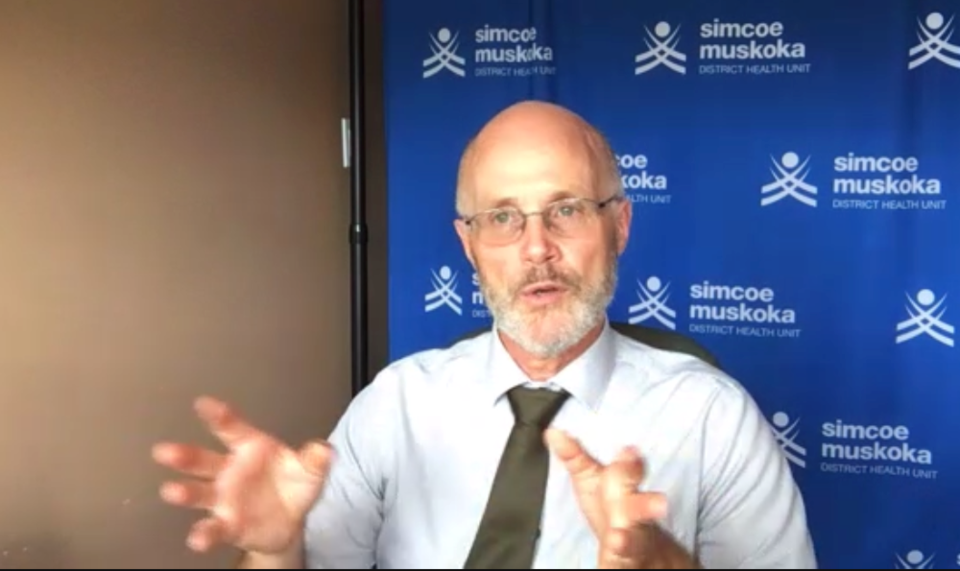Facing the incoming tide of the COVID-19 delta strain, and the beginning of the fourth wave of the pandemic in Ontario, Simcoe-Muskoka’s top doctor is grateful for a provincewide pause on reopening.
In the region, case counts are more than 2.5 times higher week-over-week, matching daily totals seen last October when kids were attending school and there was no vaccine against COVID-19 being distributed.
Now, more than 62 per cent of the region’s population is fully vaccinated against the virus, but new cases increase daily, almost exclusively (99 per cent) linked to the delta variant strain.
Dr. Charles Gardner, chief medical officer of health for the Simcoe Muskoka District Health Unit, said he is tired of the pandemic, but we’re not free yet, despite the progress seen in vaccinating a large portion of the population.
Dr. Kieran Moore, Ontario’s chief medical officer of health, announced earlier today the province would not be exiting the final step of the Roadmap to Reopen, despite meeting vaccination rate thresholds. He cited the rise in delta variant cases as part of the reason for the pause in reopening.
Gardner said he’s grateful for Dr. Moore’s announcement.
“I think that we need to continue to take COVID-19 very seriously,” he said. “This delta variant that much more so. Its history for causing waves in other parts of the world … even in places where there’s a significant amount of immunization … is a testament to how serious it is.”
He is watching case counts closely, noting they are still an important statistic for monitoring the spread of the virus.
“They are a leading indicator,” said Gardner. “It’s what happens at the front end of a wave. Ultimately, we’re very concerned about severe cases – those that require hospitalization, those that need intensive care and certainly mortality … but those things happen later.”
Both Dr. Moore and Dr. Gardner indicated it’s possible more control measures may be required depending on what happens during the fourth wave.
Moore said he’s expecting a “difficult fall and winter.”
Gardner is hoping precautions taken now will prevent mortality and severe illness later.
“The potential is there for a large wave with severe cases, and I certainly will do all I can to avoid that,” he said. “If, at the end of the day, this fourth wave proved to be less severe, I’d be happy about that.
"But it’s too early to know whether that’s going to be the case," said Gardner. "Because hospitalizations occur later, not at the very beginning. Certainly, mortality occurs later. So I think we need to take our precautions now, not wait and see if that happens.”
In addition to restrictions, Gardner said it’s important to reach the last 15 to 20 per cent of the eligible population that has not been vaccinated.
He was glad to learn of Moore’s directive requiring all high-risk settings such as hospitals and home and community care providers in the province to have a mandatory vaccination policy in place by Sept. 7 for employees, contractors, students, and volunteers to be fully vaccinated against COVID or provide medical exemptions and/or complete vaccination education sessions and take regular antigen screening tests.
“We may have to look at if there’s a need for a vaccine certificate approach … That would be a way of protecting people by allowing those who are immunized to continue to have non-essential services and otherwise reduce risk by withholding those services from people who are not immunized,” said Gardner, noting the province hasn’t indicated it will take such an approach.
“We certainly need to continue to monitor the vaccination status, because that’s such an important measure for protection.”



